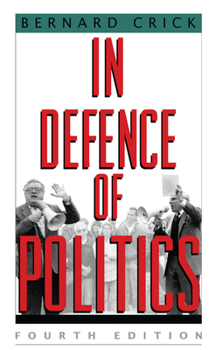In Defense of Politics
Select Format
Select Condition 
Book Overview
An ever-timely explanation of the work of politics that argues powerfully that political activity is at its heart a kind of moral activity. It's hard to get excited about politics these days. Polarization is high, getting things done seems all but impossible, and at times it seems like no one is willing to listen to anyone they disagree with. Surely there's a better way. In Defense of Politics says, loud and proud: Absolutely not. In this classic but still timely work, which recently drew strong praise from Ezra Klein, Bernard Crick argues that politics, with its compromises and frustrations aand power struggles, remains the only tested alternative to government by coercion, making both freedom and order possible in heterogeneous societies. For Crick, politics is messy and complex, and his book defends it against those who would identify it with (and reduce it to) ideology, democracy, nationalism, or technology. "Politics," Crick explains, "involves genuine relationships with people who are genuinely other people, not tasks set for our redemption or objects for our philanthropy." Clear-eyed and frank yet still capable of inspiring, In Defense of Politics is a rousing call to recommit to the hard work of bringing people together and moving society forward.
Format:Paperback
Language:English
ISBN:0226120678
ISBN13:9780226120676
Release Date:October 1993
Publisher:University of Chicago Press
Length:272 Pages
Weight:0.70 lbs.
Dimensions:0.6" x 5.6" x 8.5"
Customer Reviews
1 rating
This is one of the greatest books in the 20th century!
Published by Thriftbooks.com User , 26 years ago
I cannot believe that I am the first one to do a review ofBernard Crick's great masterpiece, "In Defense of Politics."This is a honor that forces me to question my worthiness. Crick so aptly understood that the aiming for a kind of absolutist perfection in any human relationship is dooming oneself to inevitable bitter disillusionment. This may especially be true within the political sphere. Those who indulge in a virtual cult of adoring specific "great men" totally misunderstand the goal of politics. Democracy can never be more than an attempt to search out a workable compromise between disagreeing citizens. A certain agnosticism concerning one's position is often required; a dogmatic true believer mentality may indeed become dangerous and threaten the very tenuous underpinnings of our governmental institutions. We must indeed strive to improve our political process. It is even a moral obligation to do so. Nonetheless, The search for the perfect and virtuous leader to give one's unhesitating allegiance and adoration has always resulted in a hell on earth.The political process is often yucky, disappointing, and after much effort may leave one at best with a half a loaf result. It has been said that there are two things someone with a weak disposition may wish to avoid---viewing the processing of sausage and the making of human law. Am I a cynic and possessing a defeatist attitude? The answer is an adamant no! On the contrary, Crick and I recognize the glorious possibilities of an evolving civilization premised upon frail and imperfect human beings. It takes incredible physical, intellectual and moral diligence to bring about viable human relationships of any sort. What we have so far accomplished in Great Britain and the United States is of mind boggling beauty and structural effectiveness. Bernard Crick understands the limits of politics and that a democratic society deserves two cheers, not three. Winston Churchill paradoxically said it best--democracy is usually disappointingly awful--it's simply better than all the other political systems devised and implemented throughout human history.





